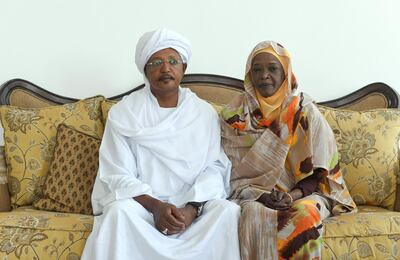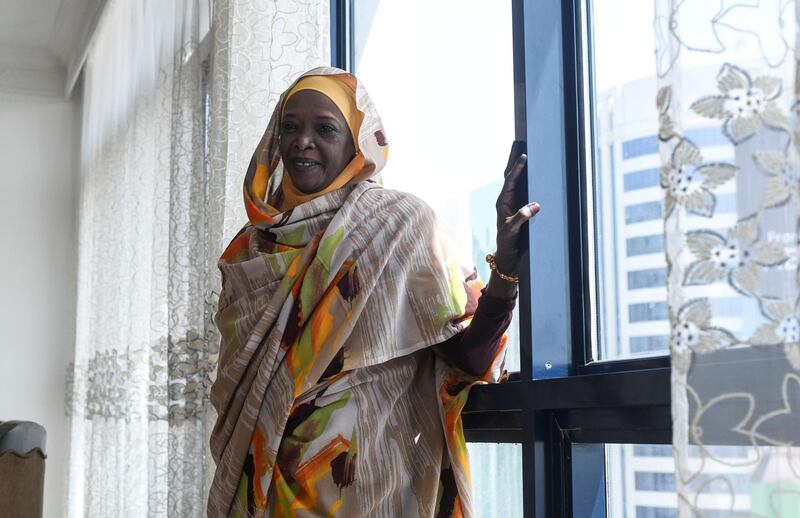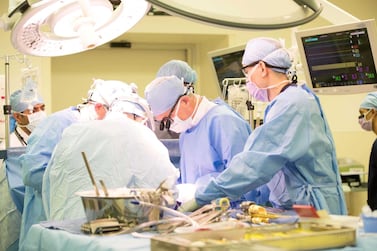A woman who suffered severe heart failure has overcome the odds to become the first person in the UAE to recover from the condition and lead an active life.
Nadia Saeed, 56, was diagnosed with dilated cardiomyopathy - a form of heart failure - in 2012 and has since required repeated hospital treatment.
Lying in the intensive care unit in Abu Dhabi three months ago, she and her family were certain her days were numbered.
But when medics decided to try a less conventional treatment option – which many believe medical advances have now superseded, Ms Saeed showed immediate improvement, and is now even back at work.
“I can’t count the times that was sure I was saying my final goodbyes to my family,” said Ms Saeed, from Sudan.
“I used to think it was a life sentence but thank God and the doctors at SKMC, I am fine, back to work and enjoying life.”
Dr Arif Al Mulla first met Ms Saeed four years ago when her heart was struggling to pump blood around her body due to her left ventricle – the heart’s main pumping chamber – becoming weak and thin.

On top of the condition, she was also regularly being admitted to hospital due to asthma attacks, putting further strain on her health.
Dr Al Mulla, a consultant cardiologist at Sheikh Khalifa Medical City in Abu Dhabi, began searching for treatment solutions but Ms Saeed failed to respond.
“From 2015 until recently I’ve been trying to optimise her medication but the problem was that she could not tolerate [it] because her blood pressure would drop,” he said.
Cardiovascular disease is the leading cause of death globally and more than 23 million people suffer from the condition worldwide.
Patients typically have a life expectancy of six months or less and many remain bed-ridden until their death.
According to the Department of Health, heart disease is also the leading cause of death in Abu Dhabi, accounting for 37 per cent of all deaths. Some 3,300 deaths due to CVD were recorded in the capital in 2016.
While the odds were not in Ms Saeed’s favour, doctors said her outlook on her prognosis played a strong part in her recovery.
“The patient has a positive attitude to life and I think that has to do with some of the success,” said Dr Al Mulla.
Despite her determination, Ms Saeed’s heart continued to weaken, prompting doctors to connect a pacemaker to her heart to regulate its beats. Her condition improved, but only temporarily.
“She improved for only a few months then again deteriorated,” said Dr Al Mulla.
“During her last admission, she had put on weight and there was a lot of fluid in her body. Her liver and renal function was getting worse.”
A few months ago, her doctor decided to try something different. He gave Ms Saeed an intravenous dose of dobutamine, a drug used to treat heart failure, which she previously could not tolerate.
Dr Al Mulla described dobutamine as an “abandoned” form of therapy that, due to medical advances, has not been widely used in many years.
“The medication is not new,” he said, but it was the process of trying out medications, not giving up that appeared to make the difference.
“The point of all this and our purpose was to get the patient back to society and functioning,” Dr Al Mulla said.
“We manage all end of stage heart failure patients and with proper management we can help get them back into society.”
The medication is administered through a portable IV pump which Ms Saeed carries in her handbag, giving her the freedom to move around - rather than be confined to a hospital bed.
Today, Ms Saeed is unstoppable. She is able to walk long distances comfortably for the first time in years and has also returned to a government job, which she previously left because of her deteriorating health.
Medics said that she was the only patient with end of stage heart failure who has become fully active and no longer requires frequent visits to hospital.
"We don't like using the word miracle but we are all pleasantly surprised by this transformation in her health," Dr Al Mulla said.







